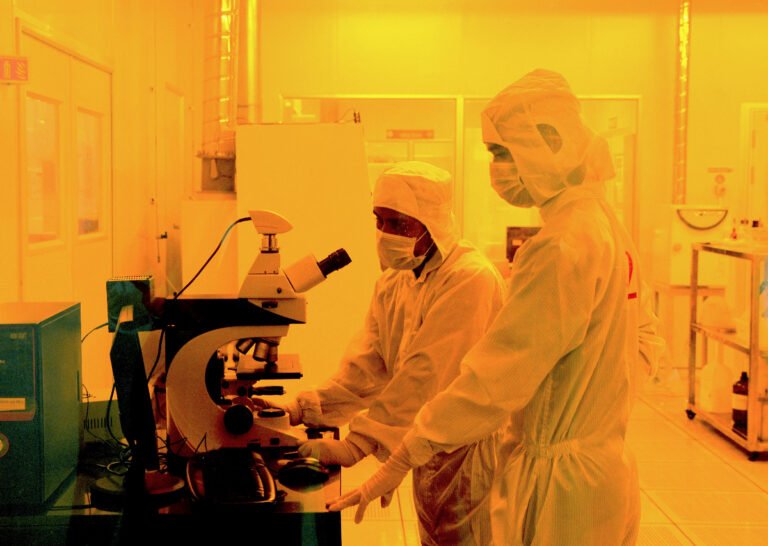
Tech sovereignty has become a looming priority for a number of nations these days, and now a startup working in semiconductors has received a major boost in aid of that effort for Germany and Europe.
The sum is one of the largest to date raised by a European startup working in semiconductors.
Black is a spin-out from the University of Aachen co-founded by brothers Daniel and Sebastian Schall (respectively the CEO and CFO).
The funding, a Series A, is important not just for its size but also because of the intention behind it.
Porsche Ventures and Project A Ventures are co-leads, with participation from Scania Growth, Capnamic, Tech Vision Fonds, and NRW.BANK.

The United States Department of Commerce Monday proposed investing as much as $6.6 billion to fund a third Taiwan Semiconductor Manufacturing Company Limited (TSMC) fab in Arizona.
The move represents a broader push to bring more manufacturing to the U.S., but unspoken in the fanfare around today’s announcement is the potential escalation of tensions with China.
TSMC Arizona — the subsidiary behind the proposed construction — has stated that it will build the facility before the end of the decade.
The United States and allies would be at a massive disadvantage should China seize control of Taiwan and its manufacturing capabilities.
For all the money the United States government continues to invest, Intel is simply playing catch-up to TSMC’s multiyear technological head start.

This grant, pegged for the company’s U.S. subsidiary, TSMC Arizona, is the latest step by the U.S. to strengthen its domestic supply of semiconductors as it seeks to reshore manufacturing of chips amid escalating geopolitical tensions between the U.S. and China.
The Act is primarily aimed at attracting manufacturing stateside, and also prohibits recipients of the funding from increasing their semiconductor manufacturing footprint in China.
With the new investment, Taiwan-based TSMC, which is the world’s largest producer of semiconductors, is broadening its plans for its fabrication plants in Arizona.
Intel could receive approximately $20 billion in grants and loans from the CHIPS and Science Act for its semiconductor manufacturing.
Meanwhile, Samsung, which announced a $17 billion additional investment in Taylor, Texas, is expected to receive more than $6 billion in grants for its chip facility in Texas.

The UK has exited the European Union, but semiconductor development is emerging as one of the areas where it hopes to partner for better economies of scale — and much-needed funding.
The UK itself said it would put up a more modest £35 million ($44 million) in funding for UK efforts over the next few years as part of that.
The Chips Joint Undertaking, for example, has an overall budget of about €11 billion from both public and private contributions.
In December 2023, Pragmatic Semiconductor, another Cambridge-based chip company, raised $231 million at a $500 million valuation.
“We are very happy to welcome the UK to the Chips Joint Undertaking as a participating state,” said Jari Kinaret, Chips JU Executive Director, in a statement.

India has approved allocating up to $15.2 billion (1.26 trillion Indian rupees) to build three new semiconductor plants, including its first semiconductor fab facility — part of the country’s big bid to take on China, Taiwan and other countries in the chip race.
On Thursday, the Indian cabinet approved the country’s first semiconductor fab facility set up by the salt-to-software conglomerate Tata Group and Taiwan’s Power Chip, which will be established in the Dholera region of Gujarat.
The Indian IT minister Ashwini Vaishnaw told reporters at a media briefing in New Delhi that the construction work for the semiconductor fab will start within 100 days.
“A typical semiconductor fab, construction is a three-four-year time frame.
This will be the country’s third semiconductor unit and will be able to produce 48 million chips per day.

Lai made impassioned comments about Taiwan’s chip industry after his victory on Saturday that seem to make it clear that his administration’s main tech focus will be on semiconductors.
Taiwan’s semiconductor industry strengthens the global standing of the country, a small island with a population of 23 million.
Another barrier is that even though the semiconductor industry is important to Taiwan’s economy, most people don’t work in it.
“Most people in the nation are not employed in the semiconductor industry, even though it’s the lifeblood of the economy,” says Patel.
Despite the challenges faced by Taiwan’s semiconductor industry, Triolo notes that its international recognition has grown significantly since Tsai came into power eight years ago.







